DIRECT Learning Series: data protection training and capacity building
The 5th workshop took place on October 2nd, 2024, in the context of the Data Rights and Enforcement through Community Trust (DIRECT) Learning Series, an ongoing thematic series of workshops with members of the DIRECT consortium, supported by Internews.
The 5th workshop took place on October 2nd, 2024, in the context of the Data Rights and Enforcement through Community Trust (DIRECT) Learning Series, an ongoing thematic series of workshops with members of the DIRECT consortium, supported by Internews.
The main goal of the series is to address topics related to the protection of personal data from three guiding axes: i) capacity-building for civil society organizations to address challenges related to the development of personal data protection legislations; ii) responsiveness and direction of civil society organizations in defending data protection rights in different legislative contexts; and iii) enhancement of the resilience and sustainability of civil society organizations through the strengthening of networks and resources led and provided by partner organizations.
This session was presented by Data Privacy Brasil, based on its expertise, on the topic of the use of data protection training and capacity building in the context of a comprehensive strategy to develop a data protection culture.
Considering that different civil society organizations in the field of human and digital rights conduct trainings and capacity building, the main goal of this first thematic workshop was to:
- Understand the role of capacity building and training initiatives for the development of a data protection culture;
- And comprehend what are the values and challenges of such initiatives;
The presentation by Mariana Rielli, co-director of Data Privacy Brasil, was drawn upon concrete experiences carried out by the institution over the past few years, through its educational focus. In this sense, some questions were raised with the intention of provoking reflections on the value and challenges of educational activities when they are also part of an advocacy strategy: i) how can we leverage the capacity and structure already in place to maximize impact across other areas and initiatives? ii) how can we be more intentional and strategic about this type of integration? iii) when does it make sense to focus on capacity building strategy to reach broader advocacy goals? iv) how to navigate various challenges when education and policy mix up?
Moving forward, Mariana mentioned that one of the main pillars of Data Privacy Brasil’s work is that every course, training, and capacity-building activity is informed by the research conducted within the institution. Therefore, such activities should not be considered an end in themselves, but rather a means to achieve a broader strategy on the topic of data protection. In light of this, and considering the potential variety of target audiences interested in these topics, one key element in developing a successful educational strategy is the need to tailor the training to the specific needs of different audiences.
One example of a successful case provided by Mariana was the training conducted for community leaders and social movements, assisted by the Public Defender’s Office of the state of Bahia, on digital rights, in which participants from both the social movements and the public defender’s office could serve as vectors for spreading this knowledge.
Alongside Mariana, Fernanda Martins, co-director of InternetLab, provided a brief presentation on their experience in conducting and developing a one-week school focused on strengthening the relationship between human and digital rights, which was also designed to vocalize and disseminate the knowledge accumulated over the 10 years of the organization’s existence. The main goal of the school was to create a multi-stakeholder environment to understand how different sectors can be better prepared to address issues related to digital platforms that emerge from a specific social context, such as the impacts of artificial intelligence; content moderation; and technology facilitated gender-based violence.
Value and challenges of focusing and implementing training as advocacy strategies
After the presentations made by Mariana and Fernanda, a short activity was conducted with the participants through a Padlet, in which they were asked about what were the value and challenges of focusing and implementing training as a broader data protection advocacy strategy.
In terms of values and opportunities, the answers pointed toward the possibility of disseminating knowledge produced by civil society organizations focused on human rights and/or digital rights; the opportunity to educate individuals about the importance of digital rights and personal data protection, as well as providing the right tools for them to better advocate for their rights; the potential to engage new actors in digital rights and data protection topics; and the creation of trust among different stakeholders through the dissemination of reliable information.
On the other hand, some challenges were highlighted, such as, for example, resource limitations in general; the need to stay constantly updated in a very dynamic field; the difficulties of personalizing courses according to the target audience, sometimes having to reconcile the different interests of various stakeholders; challenges related to the potential difficulty in understanding technical language were also pointed out. Finally, the challenges of conducting follow-ups on courses and measuring their impact were mentioned.
Open mic
During the open mic session, the discussion around impact measurement of training activities was also discussed more deeply, in which participants showed that it would be important to develop tools to assess how such activities impact subjects and if, after the training, they are more equipped to deal with issues related to data protection and digital rights.
Another topic discussed was related to the fact that maybe guaranteeing data protection could not be considered as a pressing issue for a significant portion of the society, when we consider other social issues that emerge from different countries’ contexts. In this sense, the training could leverage the establishment of direct connections between digital rights and personal data protection, and other social issues, as well as the relationship between ensuring personal data protection and the safeguarding of other fundamental rights.
Conclusion
In summary, the workshop aimed to demonstrate that conducting training and capacity building can be a powerful advocacy strategy for ensuring personal data protection, as it operates at the educational level and in raising awareness among the target audiences of such activities. However, even though these activities have the potential to help build a data protection culture, there are some challenges that need to be overcome for training and educational activities to be successful, and fulfill their objective of serving as a means to implement advocacy strategies for personal data protection.
Veja também
-
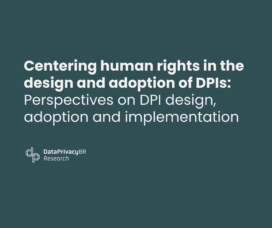
Centering human rights in the design and adoption of DPIs: Perspectives on DPI design, adoption and implementation
Members of the Global South Alliance joined the Global Digital Public Infrastructure (DPI) Summit, convened from November 4 to 6, 2025, at the Cape Town International Convention Centre in South Africa. The theme of the event was “Digital Public Infrastructure in Practice: Implementing Tomorrow’s Digital Society Today.” The summit was co-hosted by the World Bank […]
-
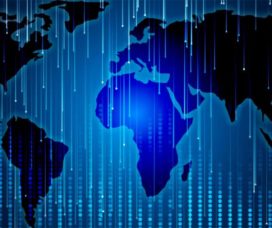
The Global DPI Summit: reframing the debate from a Global South perspective
This November, the Global DPI Summit will bring together powerful actors to champion Digital Public Infrastructure (DPI) as an opportunity for development, which demands critical thinking and not only a promotional approach. Organized by Co-Develop, the International Telecommunication Union (ITU), the United Nations Development Programme (UNDP), the UN Office of Digital and Emerging Technologies, and […]
-
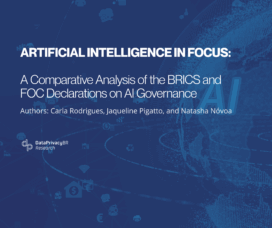
Artificial Intelligence in Focus: A Comparative Analysis of the BRICS and FOC Declarations on AI Governance
The BRICS Leaders' Declaration on Global Governance of Artificial Intelligence has gained prominence in both Brazilian and international media, as it represents a joint position by Global South countries in the ongoing contest over this emerging technology.
-
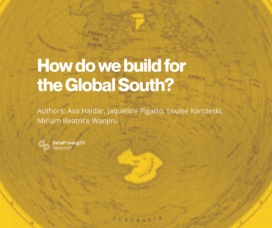
How do we build for the Global South?
We live in a world of digital divides. The Global South represents 88 percent of the world’s population and has a higher number of internet users, yet it remains under-served by digital technology. Check out the full article on our website.
-
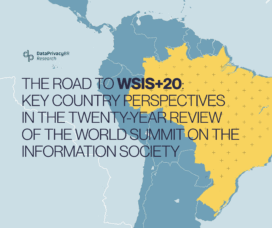
The Road to WSIS+20: Key Country Perspectives in the Twenty-Year Review of the World Summit on the Information Society
This report aims to support engagement in the WSIS+20 process by providing insight into the positions and priorities of selected governments.
-
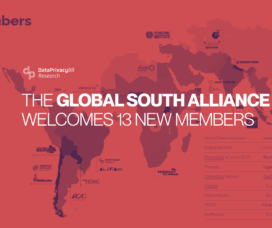
The Global South Alliance welcomes 13 new members
The Global South Alliance is a coalition formed in 2022 with the mission of unifying NGOs dedicated to the promotion of mutual learning and the advancement of digital rights with a perspective from the Global South. In May, the Global South Alliance welcomed 13 new members, reaching the total number of 26 organisations.
-

Job Opening: Digital Librarian
The Data Privacy Brasil makes the notice public with registrations until July 11th.
-
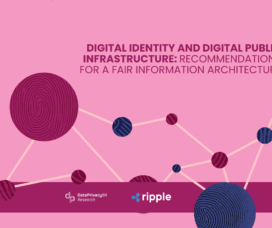
Report | Digital Identity and Digital Public Infrastructure: recommendations for a fair information architecture
Data Privacy Brasil launches its new report entitled “Digital Identity and Digital Public Infrastructure: recommendations for a fair information architecture”. The study examines the impact of a Digital Public Infrastructure (DPI), especially digital identity applications, on the protection of personal data in light of the Brazilian Federal Constitution (CF) and the General Data Protection Law (LGPD).
Veja Também
-

Centering human rights in the design and adoption of DPIs: Perspectives on DPI design, adoption and implementation
Members of the Global South Alliance joined the Global Digital Public Infrastructure (DPI) Summit, convened from November 4 to 6, 2025, at the Cape Town International Convention Centre in South Africa. The theme of the event was “Digital Public Infrastructure in Practice: Implementing Tomorrow’s Digital Society Today.” The summit was co-hosted by the World Bank […]
-

Artificial Intelligence in Focus: A Comparative Analysis of the BRICS and FOC Declarations on AI Governance
The BRICS Leaders' Declaration on Global Governance of Artificial Intelligence has gained prominence in both Brazilian and international media, as it represents a joint position by Global South countries in the ongoing contest over this emerging technology.
-

How do we build for the Global South?
We live in a world of digital divides. The Global South represents 88 percent of the world’s population and has a higher number of internet users, yet it remains under-served by digital technology. Check out the full article on our website.
-

The Road to WSIS+20: Key Country Perspectives in the Twenty-Year Review of the World Summit on the Information Society
This report aims to support engagement in the WSIS+20 process by providing insight into the positions and priorities of selected governments.
-

The Global South Alliance welcomes 13 new members
The Global South Alliance is a coalition formed in 2022 with the mission of unifying NGOs dedicated to the promotion of mutual learning and the advancement of digital rights with a perspective from the Global South. In May, the Global South Alliance welcomed 13 new members, reaching the total number of 26 organisations.
-

Job Opening: Digital Librarian
The Data Privacy Brasil makes the notice public with registrations until July 11th.
-

Report | Digital Identity and Digital Public Infrastructure: recommendations for a fair information architecture
Data Privacy Brasil launches its new report entitled “Digital Identity and Digital Public Infrastructure: recommendations for a fair information architecture”. The study examines the impact of a Digital Public Infrastructure (DPI), especially digital identity applications, on the protection of personal data in light of the Brazilian Federal Constitution (CF) and the General Data Protection Law (LGPD).
-

Five-Point Plan for an Inclusive WSIS+20 Review
As stakeholders engaged in the WSIS+20 Review process, organizations sign the petition presenting recommendations to help operationalize the WSIS+20 review modalities in order to ensure transparency, inclusion, and meaningful stakeholder engagement.
-
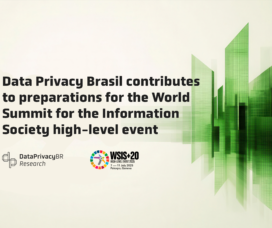
Data Privacy Brasil contributes to preparations for the World Summit for the Information Society high-level event
The event, which is co-organized by the ITU, UNESCO, UNDP, and UNCTAD, takes place in July, and this March, stakeholders were able to send their suggestions regarding the format and content to be debated, especially in light of the review process.
-
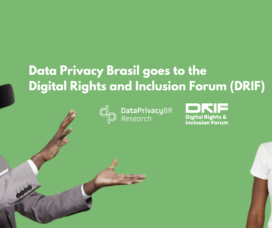
Data Privacy Brasil goes to the Digital Rights and Inclusion Forum (DRIF)
For the third consecutive year, Data Privacy Brasil will participate in the Digital Rights and Inclusion Forum (DRIF). DRIF – formerly known as the Internet Freedom Forum (IFF) – is an annual forum organized by Paradigm Initiative (PIN), since 2013, to be a space for discussions on global issues related to digital rights and inclusion.
-
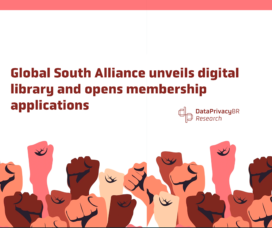
Global South Alliance unveils digital library and opens membership applications
The GSA invites organizations to express their interest in joining the network by completing the application form available until April 24.
-
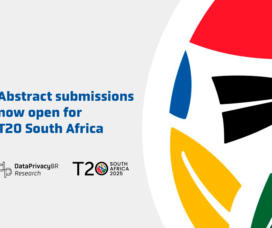
Abstract submissions now open for T20 South Africa
The Think20 South Africa invites researchers from around the world to contribute to a dynamic exchange of ideas on today's most pertinent challenges. The deadline for submitting abstracts is February 10, 2025.
-
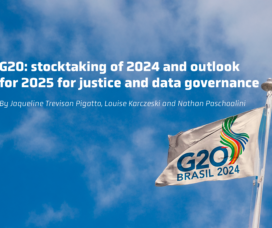
G20: stocktaking of 2024 and outlook for 2025 for justice and data governance
In 2024, Data Privacy Brasil took on a new and exciting challenge: participating in the G20 ecosystem, during the Brazilian presidency, through the official engagement group for think tanks, Think 20 (T20). Check out the text to learn more about Data's work at the G20.
-
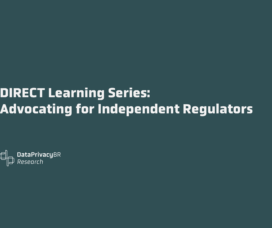
DIRECT Learning Series: Advocating for Independent Regulators
The 6th workshop took place on November 6th, 2024, in the context of the Data Rights and Enforcement through Community Trust (DIRECT) Learning Series, an ongoing thematic series of workshops with members of the DIRECT consortium, supported by Internews.
-

Exploring Opportunities in the Digital Economy and AI at the G20
The task force 5 of T20 Brasil has engaged several international think tanks to provide ideas and policy proposals on crucial areas of technological development, such as AI and Digital Public Infrastructures. This includes encouraging G20 nations to adopt policies that protect individual rights while fostering innovation.
-
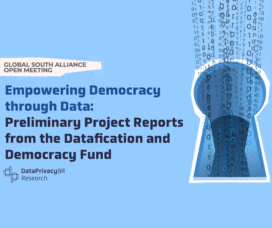
Empowering Democracy through Data: preliminary project reports from the DDF
The Global South Alliance wil host its next open meeting on October 22, 2024, where grantees from the first cohort of the Datafication and Democracy Fund (DDF) will present their impactful research.
-

Protean acknowledged for leadership in digital public infrastructure
A report from Data Privacy Brasil underscores how DPI can be leveraged to create environments where data privacy and security are prioritized.
-
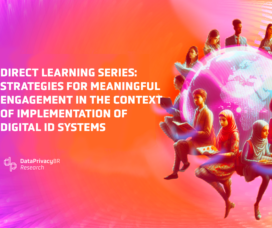
DIRECT Learning Series: strategies for meaningful engagement in the context of implementation of Digital ID systems
This workshop took place on August 28th, 2024, in the context of the Data Rights and Enforcement through Community Trust (DIRECT) Learning Series, an ongoing thematic series of workshops with members of the DIRECT consortium, supported by Internews.
-
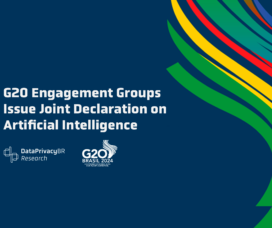
G20 Engagement Groups Issue Joint Declaration on Artificial Intelligence
On Tuesday (10), the main G20 engagement groups, including Civil 20 (C20), Labor 20 (L20), Think 20 (T20) and Women 20 (W20), announced a groundbreaking joint statement on the ethical, sustainable and inclusive development and deployment of artificial intelligence (AI).
-
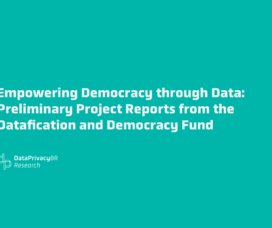
Empowering Democracy through Data: Preliminary Project Reports from the Datafication and Democracy Fund
The Global South Alliance held its first meeting with the organizations covered by the Datafication and Democracy Fund. On the occasion, each of the five organizations - Like a Palm Tree (Africa), Center of Security and Citizenship Studies (LatAm), Corporación Cambio Sostenible (LatAm), Criminal Justice & Policy Accountability Project (India), and Ikigai Innovation Initiative (Africa) - had the opportunity to present the preliminary results of their projects and hear feedbacks from the GSA members.
-
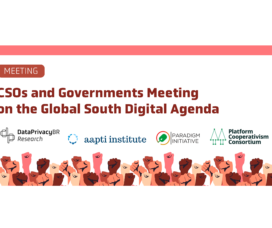
CSOs and Governments Meeting on the Global South Digital Agenda
On September 21st and 24th, the event “Open Dialogue: Global South Alliance and Governments for an Inclusive Digital Agenda” will take place, promoted by the organizations Data Privacy Brasil, Aapti Institute, Paradigm Initiative and PCC (The New School). The event aims to provide an open conversation with diplomats about the international agenda for IPRs, AI, GDC implementation and G20 continuity.
-
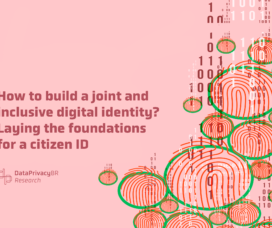
How to build a joint and inclusive digital identity? Laying the foundations for a citizen ID
Do you know what an identity is? Thinking about facilitating access to the topic, Data Privacy Brasil has developed a series of content to provide the foundations and tools possible for all the details on the subject. With this, we will be able to discuss, as a community, what we want with a digital identity and how we can achieve it.
-
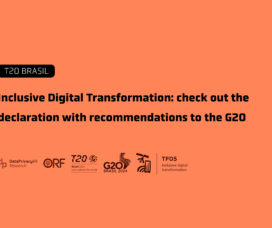
Inclusive Digital Transformation: check out the declaration with recommendations to the G20
In the document, six priorities were defined to deal with issues such as digital inclusion and meaningful universal connectivity; and challenges, opportunities and governance of artificial intelligence.
-
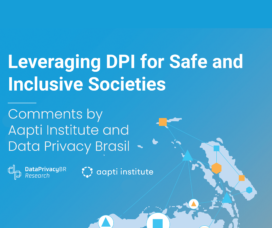
Leveraging DPI for Safe and Inclusive Societies
Aapti and Data Privacy Brasil have submitted their contribution to the Office of the United Nations Secretary-General's Envoy on Technology (OSET) and the United Nations Development Programme (UNDP) regarding the report "Leveraging DPI for Safe and Inclusive Societies".
-
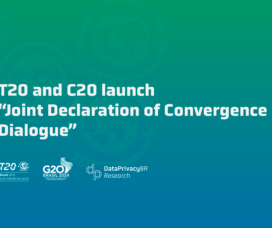
T20 and C20 launch “Joint Declaration of Convergence Dialogue”
On the 2nd and 3rd of July, a Mid-Term Conference took place in Rio de Janeiro, a T20 event with the participation of leaders from national and international think tanks, members of academia, representatives of the private and public sectors and civil society to discuss and propose solutions to the main global challenges.
-

Datafication and Democracy Fund welcomes five organizations from the Global South for short-term projects
The Datafication and Democracy Fund Committee, composed of Data Privacy Brasil, Paradigm Initiative, and Aapti Institute, is pleased to announce the five organizations awarded funding for a short-term research project.
-
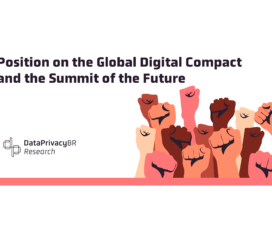
Position on the Global Digital Compact and the Summit of the Future
Between the 9th and 10th of May, the UN Civil Society Conference is happening in Nairobi. The event is presented as an opportunity to engage civil society in preliminary discussions ahead of the Summit of the Future.
-
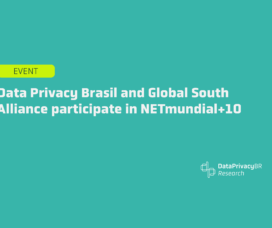
Data Privacy Brasil and Global South Alliance participate in NETmundial+10
Between April 29th and 30th, the NETmundial+10 took place in São Paulo. Building upon the event and the NETmundial Declaration of 2014, this event focused on strengthening global multistakeholder governance for the Internet and digital technologies, as well as conveying messages to global actors for better coordination of various ongoing processes.
-
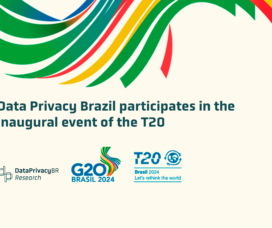
Data Privacy Brazil participates in the inaugural event of the T20
Between March 4th and 6th, the Organizing Committee of T20 Brazil - composed of CEBRI, FUNAG, and IPEA - held the first official event of the engagement group. The event took place entirely virtually and was openly broadcast to the public.
-

Inclusive Digital Transformation in the T20
The year 2024 marks Brazil's presidency in the G20, the group of the world's largest economies, chaired by our country for the first time. It is a year of great opportunity for Brazil to influence a broad global governance agenda, prioritizing issues such as inequality, climate change, and, of course, digital transformations.
-
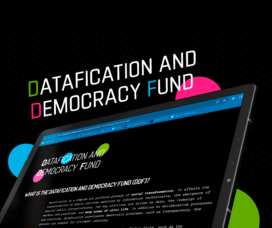
Data Privacy Brasil, Paradigm Initiative and Aapti Institute announce the launch of the “Datafication and Democracy Fund”
The fund aims to finance activities that strengthen the work of NGOs in the Global South on issues of datafication and democracy
-
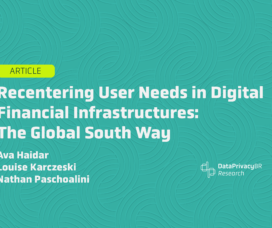
Recentering User Needs in Digital Financial Infrastructures: The Global South Way
Through India’s G20 leadership in 2023, global agendas of digital transformation and financial growth have come to be intimately reoriented to challenges, priorities and special developments in the Global South.
-

At UNCTAD eWeek, Data Privacy Brasil will discuss the intersection between digital economy and human rights in AI regulation
The UNCTAD eWeek, an initiative of the United Nations Conference on Trade and Development (UNCTAD) in partnership with eTrade for all, will occur from the 4th until the 8th of December.
-
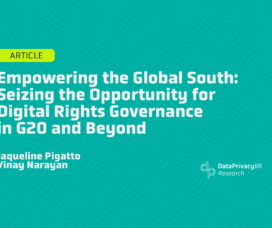
Empowering the Global South: Seizing the Opportunity for Digital Rights Governance in G20 and Beyond
The G20 represents a critical policy space for addressing emergent challenges on a global scale and its importance as a platform is pronounced when we consider its significance for the Global South.
-
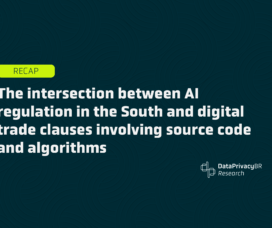
The intersection between AI regulation in the South and digital trade clauses involving source code and algorithms
Recap of Session 43 of the WTO’s 2023 Public Forum organized by Data Privacy Brasil and REBRIP
-
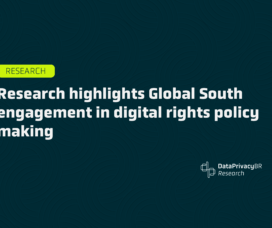
Research highlights Global South engagement in digital rights policy making
The Data Privacy Brasil Research Association announces the launch of the research report on Global South perspectives on international engagement in digital rights.
-
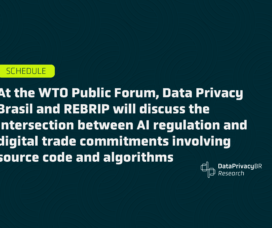
At the WTO Public Forum, Data Privacy Brasil and REBRIP will discuss the intersection between AI regulation and digital trade commitments involving source code and algorithms.
The WTO Public Forum 2023 will take place between September 12th and 15th in Geneva.
-

Data Privacy Brasil’s contribution to the Thematic Deep Dive of Artificial Intelligence and other Emerging Technologies of the Global Digital Compact
As other civil society organizations already pointed out, notable preference was given to the speech of Member States, UN agencies, and the private sector, at the expense of human rights civil society organizations, which prevented the speech that had been prepared by the DBPR and other civil society stakeholders.
-
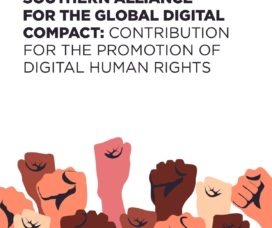
Southern Alliance for the Global Digital Compact
Responding to the call made by the United Nations, the Data Privacy Brazil Research Association, together with organizations from the Global South, presents a contribution to the Global Digital Compact.
-

Data Privacy Brasil Research Association contributes to UN open call on the relationship between human rights and technical standard-setting processes
We received a call as an opportunity to submit suggestions to inform the OHCHR report on the relationship between human rights and standard-setting processes for new and emerging digital technologies.
-
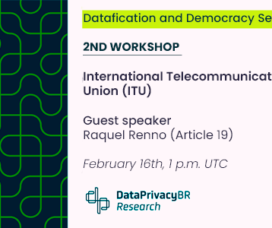
Our second workshop of a series about technical forum talks about the International Telecommunications Union
In the second meeting of the Datafication and Democracy Workshop Series, we received Raquel Renno, Digital Programme Officer of Article 19, who spoke about the International Telecommunication Union (ITU) for third sector organizations.
-
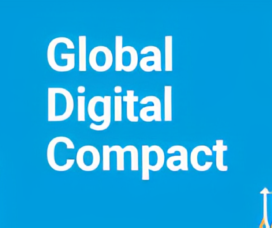
Let’s stay tuned for the Global Digital Compact
What is the Global Digital Compact and why is it important to keep an eye on it?
-

Why should we all pay attention to the Brazilian Digital ID system?
The implementation of digital identity systems is increasing around the world, especially in Global Southern countries. The model widely adopted is known as Big ID, promoted by or linked to public administration bodies which use centralized biometric databases to identify and authenticate citizens (Access Now, 2021).
DataPrivacyBr Research | Content under licensing CC BY-SA 4.0

